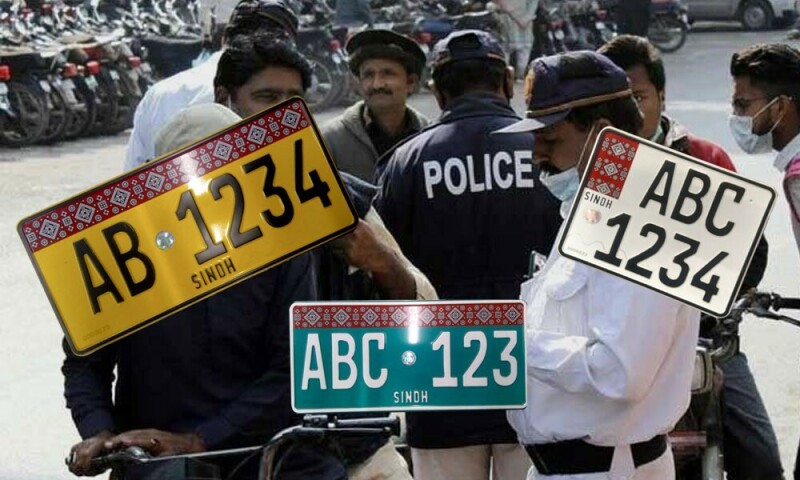Sindh’s Excise and Taxation minister Mukesh Kumar Chawla has emphasised the necessity of new car and motorcycle number plates, stating that the Safe City Project could not succeed until the security-enhanced number plates issued by the government were fully implemented.
Talking to Business Recorder, the minister clarified that only Excise offices could issue the new Ajrak design number plates and those issued by outside agents or shops would not be considered valid.
“So far, we have issued 2 million number plates for vehicles and bikes in Karachi,” the minister said.
He explained that Sindh government had first introduced these number plates in 2011 by floating tenders, in which both local and international companies participated. However, certain political parties obtained a stay order, which remained in effect until 2013.
After the 2013 elections, the Pakistan People’s Party (PPP) formed the government in Sindh again, and the process was resumed in 2014. However, another stay order was obtained by political parties, which continued until 2018.
Chawla stated that the stay order remained in place until 2021. After that, the provincial government decided not to float new tender but to continue the process on a government-to-government level.
Subsequently, the contract for manufacturing the number plates was awarded to NRTC (National Radio & Telecommunication Corporation), which had already worked in Punjab, Khyber Pakhtunkhwa and Balochistan, the official informed.
He added that work on the Safe City Project began in 2018. “So far, 12,000 cameras under safe city project have been installed.”
Chawla stressed that unless vehicles and bikes were registered and properly transferred in the name of the rightful owner, crime in the city could not be effectively controlled.
Describing the features of the new number plates, he said the plates included threads in the background, 3D holograms, and barcodes.
“They are also camera-readable, even at night.”
He said plates made in the open market did not possess those security features and could not be read by cameras, making them unacceptable under the new system.
The minister stated that the Excise Department had launched three different colored number plates: white plates for private vehicles and bikes, yellow plates for commercial vehicles, and green plates for government vehicles.
He mentioned that the fee for vehicle number plates—whether government or commercial—was set at Rs2,450, while the fee for bike plates is Rs1,850.
Chawla added that the registration process was not limited to cars and bikes but those with trucks and dumpers could also apply.
He said the Excise Department had integrated its data with the Police and Traffic Police departments.
“Through this data linkage, authorities can determine which vehicles have paid taxes and which have not.”
According to conservative estimates, around 5 million vehicles and motorcycles exist in Karachi. With the implementation of the new system, the Excise Department believes it would have accurate data on the actual number of vehicles.
Around 2 million vehicles and bikes had been registered since 2023, and number plates had been issued to their owners, he added.
In the first batch, as per data provided by the minister, 800,000 plates were manufactured by NRTC, while in the second batch, 1.2 million plates were produced and delivered.
Chawla also revealed that the Excise Department achieved a revenue target of 20 billion rupees in the fiscal year 2024-25.
When asked about the third-party agents or “agent mafia” active outside Excise offices, Chawla said strict action would be taken against them.
He emphasised that the entire process was being conducted under a one-window operation and advised the public to directly approach Excise offices instead of dealing with agents.
Meanwhile, a car owner Muhammad Danish told Business Recorder that he had paid an agent Rs10,000 to get his car registered, and received the number plate within a month.
Sohail Khan, a bike owner, said he had applied for a number plate three months ago but hasn’t received as yet, despite several visits to the Excise office.
Another Motorcycle rider Muhammad Faiz Ahmed said he had a duplicate number plate made from the market and was managing with it. He expressed his lack of trust in the system, saying he believed deadlines would continue to be extended and things would remain the same.
Earlier this week, leaders of the All Pakistan Organisation of Small Traders and Cottage Industries Karachi urged the Chief Justice of Sindh to take suo motu notice of what they term a “broad daylight robbery” of Rs8 billion, being extracted from Karachi’s citizens and traders under the pretext of replacing motorcycle number plates with newly designed Ajrak-themed ones.
“The new number plate campaign has turned into an excuse for bribery and exploitation by police,” they said in a joint statement.
